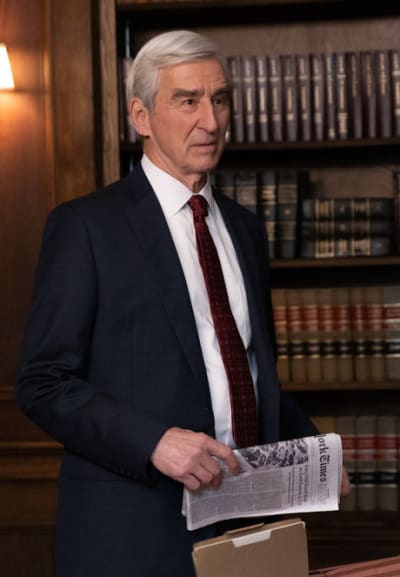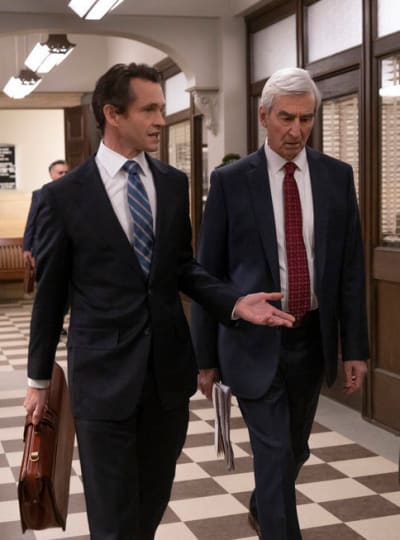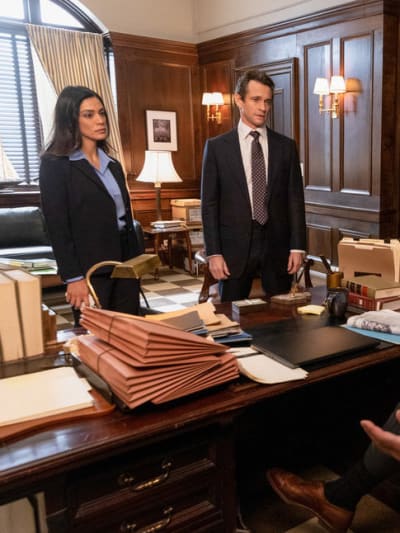When do words become an invitation to kill? Where do we draw the line between free speech and incitement to violence? And in today's anything-goes political environment, can extremists be held accountable when lies lead to murder?
These are some of the questions Law & Order Season 21 Episode 5 asked viewers to consider.
It was an interesting premise that could have benefited from a more in-depth treatment, but it was must-see TV anyway.
As a general rule, when someone claims that a victim was a "great guy," usually it turns out they were into something shady, at least on TV.
But given shock-jock Reed's behavior at the beginning of the hour and the fact that photos suggesting Hoyt was a pedophile magically turned up after his death, it wasn't surprising that all the rumors were fake.
Reed claimed that he was just exercising his First Amendment rights, but stealing photos and altering them to bolster his claims went beyond speech. This story wasn't about whether Reed SHOULD be found guilty; it was about whether he would be.
That was unfortunate, as these issues deserved a bit more nuanced treatment.
There's no doubt that there's a problem in the United States with politicians saying anything they please to rile up their base and get votes and that there are far-right agitators out there who want to whip people into a frenzy with outrageous claims.
Nor is there any doubt that such words can lead to violence.
However, it's tricky to approach these kinds of stories without becoming preachy or one-sided. They tend to become "preaching to the choir" type stories in which people who already agree that this is a serious problem nod their heads in agreement. At the same time, everyone else thinks this is exaggerated nonsense.
It's not that Reed and Lopez weren't realistic. But Reed was such a right-wing extremist that he almost became a caricature of what he was supposed to represent.
Once we got to the legal side, it felt totally one-sided despite the accuracy. While the defense attorney made a lot of noise about how his client's freedom of speech rights should have trumped any case against him for inciting violence, there wasn't much other discussion.
Defense attorney: Social media posts are covered under the First Amendment.
Price: Your client cried Fire in a crowded movie theatre and Derek Hoyt got trampled.
Judge: I agree with Mr. Price. There is a case to be made here. I don't know if it's winnable, but it's tryable.
There was one argument in the judge's chambers, which Price easily won, and then the freedom of speech issue wasn't mentioned again.
Reed muddied the waters by claiming that someone else likely used his computer to send those messages. He might have had a more compelling case if he'd stuck to his freedom of speech argument.
His claims that some employee used his computer without his knowledge to make incendiary claims about Hoyt were simply ludicrous and easily disproven, and that video of him making a "joke" about getting someone to kill liberals for the ratings sealed the deal.
What kind of legal strategy was that? Both storywise and thematically, it would have been far better to take the stance that he wrote those messages but that he never intended or planned for anyone to take him literally.
While Samantha argued that this was a revolutionary case that required extraordinary evidence and the judge said he wasn't sure it was winnable, it felt like success was a foregone conclusion.
This is partially a problem with the formula. So far, Price has pulled a win out at the last second on every case. Five cases in, viewers are primed to expect that. So there was no doubt whatsoever that Price would get his win -- the only question was HOW.
Law & Order would be stronger if Price didn't always win. Viewers don't need a happy ending every time. Losses that should have been wins can make a powerful statement that gets people talking, and the drama is more riveting when we don't know for sure what the outcome will be.
This was especially true in this case, where the high stakes seemed to fizzle out.
What happened to the protesters who were convinced Reed was a martyr? They were only there for atmosphere, it seemed since they weren't mentioned again after the first time Price and Maroun encountered them.
A bunch of right-wing supporters set up a GoFundMe to get Lopez out of jail, yet no one had any comment after he supposedly committed suicide. That was strange for a bunch of people who seemed to be into conspiracy theories!
If any of these loose ends had been made into a more central part of the story, it would have turned a good episode into a great one.
If anything, prosecuting Reed should have made him into a martyr.
While that didn't happen in this episode, I wondered if there would be fallout later on.
Price said he got a death threat after winning the case. That might have been a throwaway line, meant merely to point out that they had only won this battle and not the war against misinformation and its consequences.
But it also could have been foreshadowing of things to come.
Your turn, Law & Order fanatics. How powerful did you find this story, and did you think it was too on-the-nose?
After you watch Law & Order online, hit the big, blue SHOW COMMENTS button and let us know!
Law & Order airs on NBC on Thursdays at 8 PM EST / PST.
source https://www.tvfanatic.com/2022/04/law-and-order-season-21-episode-5-review-free-speech/










0 comments:
Post a Comment